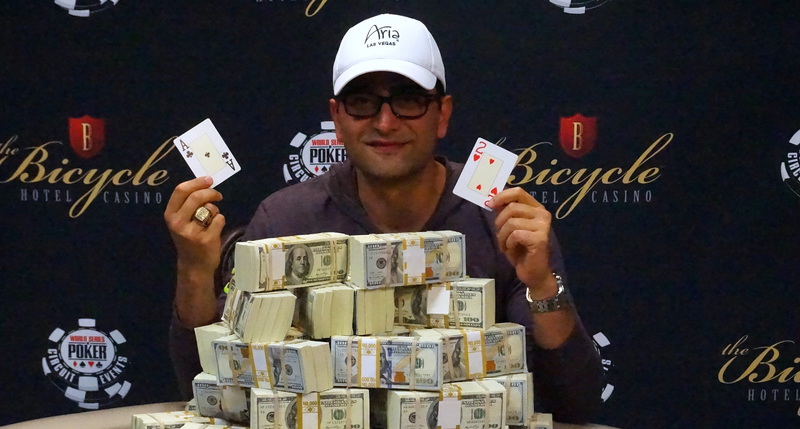Poker Hand of the Week: 4/1/16You Decide What's The Best Play |
|
|
Give us your opinion in the comments section below for your chance at winning a six-month Card Player magazine digital subscription.
Ask any group of poker players how you played your hand and they’ll come up with dozens of different opinions. That’s just the nature of the game.
Each week, Card Player will select a hand from the high-stakes, big buy-in poker world, break it down and show that there’s more than one way to get the job done.

The Scenario
There are four players remaining in a $1,500 buy-in tournament. You are guaranteed to earn at least $76,830, but have your eyes firmly set on the $226,785 first-place prize. The overwhelming chip leader, with 10,120,000, is one of the most accomplished poker players of all time. Your other two opponents, who have 2,265,000 and 850,000, respectively, are longtime tournament grinders with impressive results.
You have also had some great results in the past, but aren’t considered to be a full-time player. With 1,890,000, you are in third place overall. The blinds are 40,000-80,000 with a 10,000 ante, giving you 23 big blinds to work with.
You are first to act and look down at K 8
8 , and decide to raise to 200,000. The button and small blind fold, but the chip leader calls from the big blind. The flop is J
, and decide to raise to 200,000. The button and small blind fold, but the chip leader calls from the big blind. The flop is J 8
8 8
8 , giving you trips.
, giving you trips.
Your opponent checks, and you bet 150,000. He calls and the turn is the 3 . He checks again, and you bet 400,000. Once again, he calls and the river is the J
. He checks again, and you bet 400,000. Once again, he calls and the river is the J . Your opponent checks. You have 1,130,000 behind and the pot size is currently 1,580,000.
. Your opponent checks. You have 1,130,000 behind and the pot size is currently 1,580,000.
The Questions
Do you check behind or bet? If betting, how much? Is there any way to get more value out of your hand? Can you get called by worse? How likely was the river to help your opponent? What does his river check say about his hand?
What Actually Happened
 At the World Series of Poker Circuit main event at the Bicycle Casino in Los Angeles, 2006 WSOP main event winner Jamie Gold opted to check behind with his K
At the World Series of Poker Circuit main event at the Bicycle Casino in Los Angeles, 2006 WSOP main event winner Jamie Gold opted to check behind with his K 8
8 on a board reading J
on a board reading J 8
8 8
8 3
3 J
J .
.
“How good do you run?” asked Gold. “Paying me off the whole way, and the jack comes on the river to save you.”
Gold’s fears were realized when his opponent, Antonio Esfandiari, turned over J 6
6 for a rivered full house. Despite the setback, Gold did managed to claw his way back to a second-place finish, good for $139,820. Esfandiari went on to win the tournament, his first WSOP Circuit ring, and the $226,785 first-place prize.
for a rivered full house. Despite the setback, Gold did managed to claw his way back to a second-place finish, good for $139,820. Esfandiari went on to win the tournament, his first WSOP Circuit ring, and the $226,785 first-place prize.
What would you have done and why? Let us know in the comments section below and try not to be results oriented. The best answer will receive a six-month Card Player magazine digital subscription.
